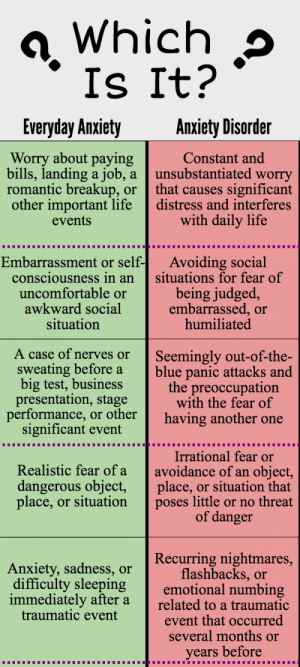
Understanding Stress & Anxiety

It's a normal part of life to experience occasional anxiety.
But you may experience anxiety that is persistent, seemingly uncontrollable, and overwhelming. If it’s an excessive, irrational dread of everyday situations, it can be disabling. When anxiety interferes with daily activities, you may have an anxiety disorder.
Anxiety disorders are real, serious medical conditions - just as real and serious as physical disorders such as heart disease or diabetes. Anxiety disorders are the most common and pervasive mental disorders in the United States.
The term "anxiety disorder" refers to specific psychiatric disorders that involve extreme fear or worry, and includes generalized anxiety disorder (GAD), panic disorder and panic attacks, agoraphobia, social anxiety disorder, selective mutism, separation anxiety, and specific phobias.
Obsessive-compulsive disorder (OCD) and posttraumatic stress disorder (PTSD) are closely related to anxiety disorders, which some may experience at the same time as depression.
Irritable Bowel Syndrome, also called IBS, is characterized by abdominal pain, cramping, bloating, gas, constipation, and diarrhea. Click here to learn more about IBS and its connection to stress and anxiety.
What is Anxiety? (from ADAA's partner organization Anxiety.org) is an in-depth analysis and explanation of key anxiety disorders written by ADAA member experts.
Depression is a condition in which a person feels discouraged, sad, hopeless, unmotivated, or disinterested in life in general for more than two weeks and when the feelings interfere with daily activities. Major depression is a treatable illness that affects the way a person thinks, feels, behaves, and functions. At any point in time, 3 to 5 percent of people suffer from major depression; the lifetime risk is about 17 percent.
Facts and Statistics
- National prevalence data indicate that nearly 40 million people in the United States (18%) experience an anxiety disorder in any given year.
- Approximately 8% of children and teenagers experience an anxiety disorder with most people developing symptoms before age 21.
- Only about one-third of those suffering from an anxiety disorder receive treatment, even though the disorders are highly treatable.
- In addition, according to the World Health Organization (WHO), 1 in 13 globally suffers from anxiety. The WHO reports that anxiety disorders are the most common mental disorders worldwide with specific phobia, major depressive disorder and social phobia being the most common anxiety disorders.
Find more facts about anxiety disorders.
Read this important and helpful article "What is Anxiety?" from our partner Anxiety.org.
Videos
See what people with anxiety disorders are saying about how they manage.
Watch or download videos on how to manage and overcome stress and anxiety, including how to reduce stress, the differences between normal everyday anxiety and an anxiety disorder, how to recognize symptoms, and what to do if you have generalized anxiety disorder (GAD) or OCD.
Everyday anxiety or an anxiety disorder?

Researchers are learning that anxiety disorders run in families, and that they have a biological basis, much like allergies or diabetes and other disorders. Anxiety disorders may develop from a complex set of risk factors, including genetics, brain chemistry, personality, and life events.
You Might Also Enjoy...


How NightLase® Can Help With Snoring

How Laser Therapy Can Help Decrease Vaginal Dryness and Increase Sexual Pleasure

Five Signs You Could Be Suffering From Low Testosterone

Why Do I Still Get Acne, and How Can I Get Rid of It Without Medication?

